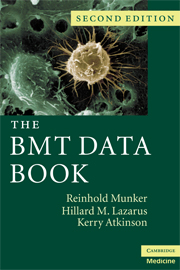Book contents
- Frontmatter
- Contents
- List of contributors
- Foreword
- Preface
- Acknowledgments
- Section 1 Basic science
- Section 2 Hematologic malignancies
- Section 3 Solid tumors
- 11 Therapeutic decision making in stem cell transplantation for breast cancer
- 12 Therapeutic decision making in BMT/SCT for nonseminomatous germ cell tumor of testis (NSGCT)
- 13 Therapeutic decision making in BMT/SCT for renal cell cancer
- 14 Therapeutic decision making in BMT/SCT for soft tissue sarcomas
- Section 4 Nonmalignant disorders
- Section 5 Practical aspects and procedures
- Section 6 Complications
- Section 7 The BMT/SCT pharmacopoeia
- Section 8 HLA-testing and laboratory medicine
- Appendix
- Index
- References
13 - Therapeutic decision making in BMT/SCT for renal cell cancer
Published online by Cambridge University Press: 31 July 2009
- Frontmatter
- Contents
- List of contributors
- Foreword
- Preface
- Acknowledgments
- Section 1 Basic science
- Section 2 Hematologic malignancies
- Section 3 Solid tumors
- 11 Therapeutic decision making in stem cell transplantation for breast cancer
- 12 Therapeutic decision making in BMT/SCT for nonseminomatous germ cell tumor of testis (NSGCT)
- 13 Therapeutic decision making in BMT/SCT for renal cell cancer
- 14 Therapeutic decision making in BMT/SCT for soft tissue sarcomas
- Section 4 Nonmalignant disorders
- Section 5 Practical aspects and procedures
- Section 6 Complications
- Section 7 The BMT/SCT pharmacopoeia
- Section 8 HLA-testing and laboratory medicine
- Appendix
- Index
- References
- Type
- Chapter
- Information
- The BMT Data Book , pp. 177 - 188Publisher: Cambridge University PressPrint publication year: 2009

